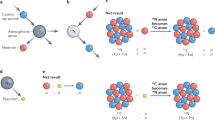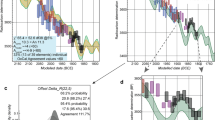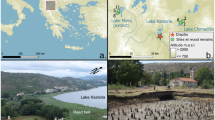Abstract
SEEING that the radioactive carbon method for dating the past so lucidly described by Prof. F. E. Zeuner in Nature of November 4, p. 755, was evolved primarily to test certain physical hypotheses, it may be of interest to physicists to see how far the application of the method to materials relatively or absolutely dated by archæological methods yields consistent or confirmatory results. More than five hundred radiocarbon dates have now been published1. Attached to each is the standard deviation, “consisting solely of the error of counting random events”. These dates include seven objects from Egypt and five from northern Europe, at least the relative ages of which are well established by archæological methods.
This is a preview of subscription content, access via your institution
Access options
Subscribe to this journal
Receive 51 print issues and online access
$199.00 per year
only $3.90 per issue
Buy this article
- Purchase on Springer Link
- Instant access to full article PDF
Prices may be subject to local taxes which are calculated during checkout
Similar content being viewed by others
References
“Radiocarbon Dates”, by J. R. Arnold and W. F. Libby (University of Chicago, Institute for Nuclear Studies, 1950).
Author information
Authors and Affiliations
Rights and permissions
About this article
Cite this article
CHILDE, V. Comparison of Archæological and Radiocarbon Datings. Nature 166, 1068–1069 (1950). https://doi.org/10.1038/1661068b0
Issue Date:
DOI: https://doi.org/10.1038/1661068b0
This article is cited by
-
II. Growth rings and climate
The Botanical Review (1955)
Comments
By submitting a comment you agree to abide by our Terms and Community Guidelines. If you find something abusive or that does not comply with our terms or guidelines please flag it as inappropriate.



